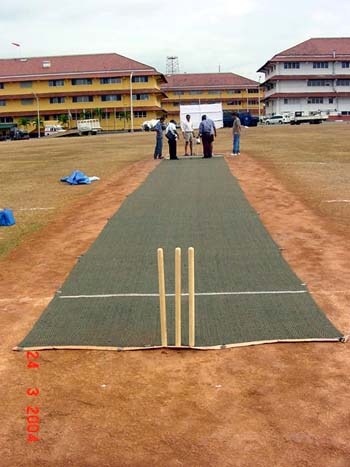|
|
|

Aravinda de Silva: "Playing on matting wickets will create much better players because that extra bounce will encourage batsmen to play shots square of the wicket and produce more gutsy players."
© Getty Images
|
|
| |
Blaming the mediocre standard of batsmen in school cricket today partly to the preparation of substandard pitches, Aravinda de Silva, the former Sri Lanka batsman, is of the opinion that playing school matches on matting surfaces than on turf pitches would improve the quality of batting significantly.
Being appointed consultant coach to the Sri Lanka under-19 World Cup team enabled de Silva, who retired from international cricket five years ago, to make a close study of the declining standards of school cricket in Sri Lanka and this is what he observed.
"As I see it, playing on matting wickets will create much better players because that extra bounce will encourage batsmen to play shots square of the wicket and produce more gutsy players," de Silva said. "One thing we should look at is that some of the fast bowlers of today can't get the ball to rise waist high."
"We played most of our cricket at school on matting wickets. It is easier to switch over from matting to turf. There are two sides to playing on matting. On turf you get use to playing on different sort of surfaces. But at a younger age I don't think that is necessary. You must allow them to go and play their normal cricket, to play with aggression. The advantages are greater to develop batsmen than bowlers on matting."
Throughout his illustrious career he remained the most feared batsman in the middle-order, capable of single-handedly changing the course of a match. He was renowned for being a fearless hooker and cutter of the ball even against the fastest of bowlers in the world. He had the freedom and confidence to play shots all around the wicket because of the quality of cricket he played at DS Senanayake MV where his natural talents were allowed to flow.
"Playing tough competitive cricket on good wickets is what our youngsters lack. They lack a lot of confidence because of poor wickets. Arjuna [Ranatunga] made a triple hundred at the age of under 15 and players used to get double hundreds regularly during our time. Today as a team schools are averaging totals of 190-200 except for some schools that play on good wickets."
"That is perhaps mainly because the batsmen lack in confidence to play their shots. The only way to give them the confidence is to prepare good batting surfaces. But most schools cannot afford to maintain turf wickets and therefore play on substandard surfaces.
"Even for the bowlers why we don't develop good spinners is because the wickets are all crumbling. Also there is no competition to create situations because they play safe games. Some of the coaches go round setting fields and not allowing the players to think on their own. More than winning competitions coaches must get players to think and make decisions on their own. This would allow the boys to study the game from a young age."
De Silva's remedy to overcome this shortcoming is to field a schools team in the inter-provincial tournament. "They will gain a lot of experience from the exposure that will be given to them. Playing with guys like Mahela [Jayawardene] and Kumar [Sangakkara] will give them competitive cricket and a chance to learn the game."
Having watched how the under-19 World Cup teams of Pakistan and England played in the recently concluded tri-series in Colombo, De Silva said: "The Pakistan and England sides are very much matured. They have more thinking cricketers than our guys. The Pakistan bowling attack is a lot better that Sri Lanka and England because most of the bowlers have got exposure at first-class level. Every bowler was able to move the ball, which is a very good sign at that age. Our batsmen found it difficult to face up to the Pakistani bowlers when the ball started to move around because they play on flat and slow wickets at school."
Sri Lanka lost all three fixtures (including the final) to Pakistan in the tri-nation series. de Silva suggested that as the Junior World Cup is played every two years, Sri Lanka should pick a pool one year ahead from the under 17 squad and prepare for the event.

